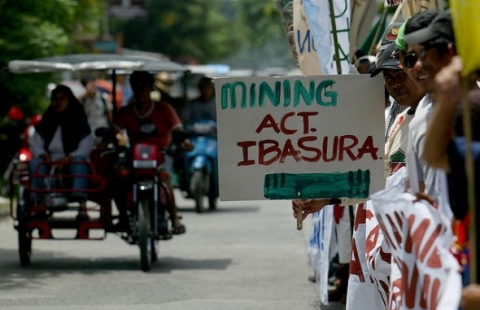Murder in Mindanao & repression against human rights defenders in Peru
Published by New Internacionalist
Mining routinely disrupts and destroys people’s lives and livelihoods – it forces people from their land and devastates the natural environment on which they depend. For human rights defenders across the world, the fight for justice is frequently met with brutal repression and all too often the tragic and needless loss of life.
In July 2015, human rights defenders met in the Philippines for the annual International People’s Conference on Mining. Less than a month later, one of them was dead – brutally assassinated on the Philippine island of Mindanao.
Since 2005, Emerito Samarca, executive director of the Alternative Learning Centre for Agricultural and Livelihood Development (ALCADEV), had been fighting for the rights of the Lumad, a group of indigenous people defending themselves and their ancestral homelands against the threat of mining.
On 1 September 2015, 40 soldiers and a paramilitary group occupied the local school and threatened to massacre the entire community unless they left within 48 hours. This was when Emerito and two local leaders were killed in broad daylight, as the community looked on.
Fearing for their lives, some 2,000 indigenous people fled – the latest episode in a long history of violence and intimidation.
For a decade now, community members have been the victims of trumped-up criminal charges, illegal arrests and detention, and torture.
Shamefully, to date, the local government has turned a blind eye to these recent atrocities, failing also to provide any humanitarian assistance for the people bullied from their land and forced from their homes.
Karapatan, an alliance of individuals, groups and organizations working for the promotion and protection of human rights in the Philippines, has since stated that collusion between the armed forces and paramilitary groups had been reported in previous cases where community leaders had been killed.
While innocent people are being murdered in the Philippines, on the other side of the Atlantic, 16 community leaders in Peru are facing up to 35 years in prison for publicly expressing their opposition to the World Bank and US-owned Newmont Mining’s ‘Conga Project’ (a gold and copper mining venture in the northern highlands of Peru).
Some of these leaders have also been physically attacked by Peru’s state forces during public protests, and 5 people were killed during public demonstrations against the project. Yet the Peruvian government has yet to bring anyone to justice.
In both the Philippines and Peru, human rights defenders have raised grave concerns over allegations of collusion between the armed forces and corporations such as Glencore in the Philippines and Newmont Mining Corporation in Peru.
Moreover, in Peru, the involvement of both the Catholic Church and the World Bank shows the extent to which international and national bodies are complicit in human rights violations.
Both of these institutions have a stake in the Conga Project and both have refused to condemn the killings and repression of communities and their leaders. The Archbishop of Lima has even publicly acknowledged that the Church will be a direct beneficiary of the Conga Project.
Human rights defenders and community leaders have long been accused of terrorism, incitement to violence and public intimidation by governments determined to silence dissenting voices.
Trumped-up criminal charges and other onerous judicial processes, lasting for years, not only nullify the work of human rights defenders but serve to deter others from speaking out.
Ultimately, the legitimate right to protest is criminalized by the state – the impact of which can be severely distressing.
In both Peru and the Philippines, human rights defenders suffer long-term psychological pressure as a result of having to endure endless judicial processes, where hearings are frequently postponed and further financial costs are incurred.
In many cases, people are detained for long periods without being charged. In the Philippines, a female community leader recently explained how she had to attend a hearing every month, paying fees for each session over a period of two years. To this day she doesn’t know why she has been charged.
Forcing people from their homes and silencing anyone who opposes the plundering of resources appears to be the norm for extractive industries.
And with help from the state, it seems their unofficial handbook reads: militarize territories with the army and paramilitary forces; use the judicial system to criminalize human rights defenders; create conditions which divide communities and buy up community leaders. And if these tactics don’t work? Massacre and displace local people.
The recent killings in Mindanao and those of others fighting injustice around the world cannot go unpunished. It’s a testament to the remarkable courage and determination of human rights defenders, and those communities facing off against extractive industries, that the struggle to hold companies and governments to account for their crimes goes on. The people are resolute; they’re fighting back.
- See more at: http://newint.org/blog/2015/09/18/mindanao-mining-murder/#sthash.Pv341i7...

Nosotros somos GRUFIDES!
Mantente en contacto
Contáctanos
info (@) grufides.pe
+51 076 34 2082
+51 976 465 169
RPM: #767539
Cajamarca - Perú






Agregar comentario